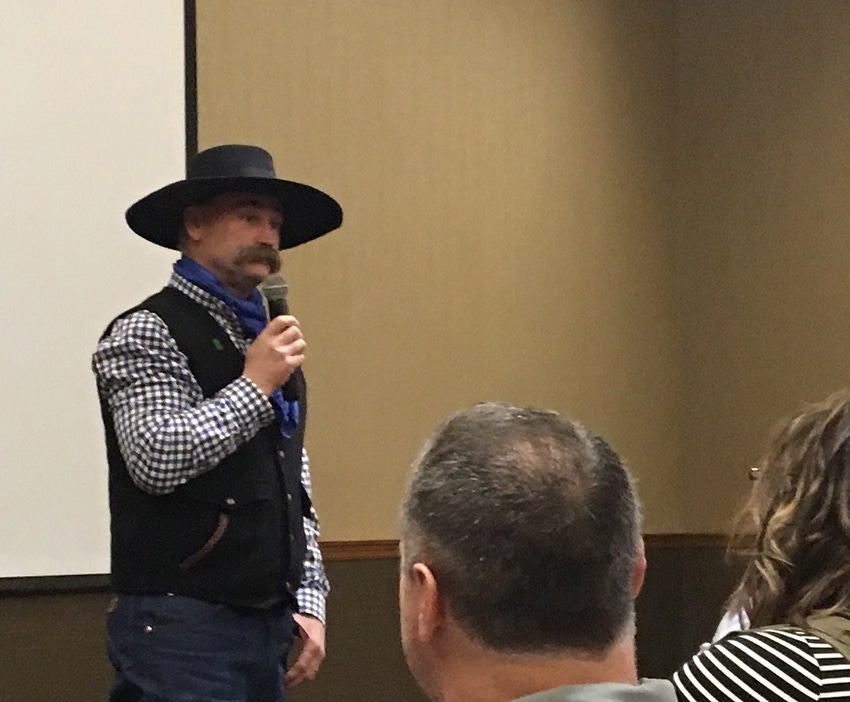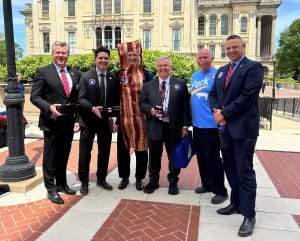Farm to fork: A rich man’s war, a poor man’s fight
It's ultimately the consumers who struggle to make ends meet each week who will suffer from these measures.

For Trent Loos, there is no better quote than the one President Ronald Reagan gave during his 1969 speech as governor in Sacramento, Calif.
“The trouble with our Liberal friends is not that they’re ignorant, it’s just that they know so much that isn’t so.”
While Reagan’s speech tackled some of the political issues of that time, Loos says we can easily replace “Liberal friends” with our “nation” today when it comes to society and the complete disconnect between farm to fork.
“If somebody asks a question today about how you treat your sows, what you do to your pigs in the farrowing houses, or what the GMO consequences are of the food you are feeding your animals … they can find answers to all of that with a Google search,” Loos says. “That brings us to why we need to get a better handle explaining who we are and what we do.”
This week at the 50th annual South Dakota Pork Congress, the 52-year-old central Nebraska pork and beef producer and radio personality encouraged a packed-room of farmers and industry representatives to stop telling their story, and instead control the narrative.
“I’ve been trying to tell our story for 20 years, and quite frankly it started at this event 20 years ago when we were still living on the Rosebud, and I’ve been out and about, and I’ve spoken to audiences in 48 states and four different continents, all talking about telling your story,” Loos says. “Guess what, you and I are the only ones that care.”
While the neighbors may have thought it wasn’t bad to go after a large corporation such as Smithfield in the North Carolina nuisance lawsuits and the consumers in California thought Prop. 12 legislation would only dictate animal welfare and not affect price, Loos says it’s ultimately the consumers who struggle to make ends meet each week who will suffer from these measures.
His family saw that firsthand recently when they gathered with other kids from purebred swine associations across the United States to try to serve food banks in Indianapolis. They were able to see all the politics and bureaucracy surrounding food banks, while visiting with several families who couldn’t even afford to go to another pantry two miles down the road.
Loos says that trip put it in all perspective and that it truly is “a rich man’s war and a poor man’s fight.”
“At the end of the day we will figure out a way to meet bureaucracy, but more people will suffer,” Loos says. “We need to find a way to empower those that reap the rewards from what we do and come in the trenches with us.”
Instead of being reactive, he encourages the industry to get ahead of the game and explain why antibiotics are needed on farms, how gestation crates are the best way to protect animals from other animals and why artificial insemination is a safer procedure for reproduction. As celebrities such as Beyoncé and Jay-Z come out supporting a vegan diet, Loos says we need to share more information with consumers on how the protein we produce supports physical and mental health and should be part of daily diets.
Finally, Loos says it’s not just our duty in the industry to educate consumers, it’s our right to do so.
Being part of the All-American Beef Battalion for the past 11 years and feeding the troops upon their return from deployment has been a very humbling experience for Loos. Seeing that true patriotism, military personnel who have lost limbs, comrades and even their families upon return, Loos says it’s difficult to say thank you enough to these service men and women, but he’s found one way to do so.
“If you really want to say thank you to the men and women who have risked so much to protect your freedom then what you will do is exercise the rights they have protected for you and No. 1 on that list is the freedom of speech, the right to be heard, the right to assemble, the right to do what we are doing here today,” Loos says. “We are only as strong as every one of us contributes to being loud and being part of the solution because we are going to continue to have anti-groups that will create problems and then ask for money to help solve a problem they have created in perception.”
About the Author(s)
You May Also Like




